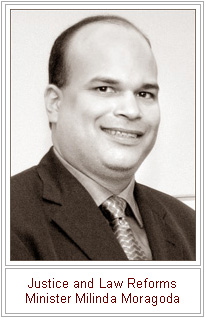
| 20/08/2009 - Daily News | |||
Human trafficking, piracy and maritime terrorism |
|||
|
|||
Address by Justice and Law Reforms Minister Milinda Moragoda, at the 48th Annual Session of the Asian-African Legal Consultative Organization at Putrajaya, Malaysia on the August 18. The Asian-African Legal Consultative Organization, which emerged from its origins as a “Committee” of legal experts always had its roots in the reality of international politics. For well over half a century, it has provided an increasing membership with both information and analysis of important legal issues confronting Asian and African States. The Secretary-General and Staff of this institution, from its inception under the guidance of B. Sen, have performed admirably the complex task of advising the great majority of its membership that are developing countries, while taking due account of the fact that some of its members are among the more economically advanced, and others are gradually emerging to claim that distinction. |
|||
|
|||
Traditional terms |
|||
When the Convention was negotiated between 1973 and 1982, piracy was no longer considered a serious threat, and so was provided for in the very traditional terms of the High Seas Convention of 1958, as an offence that was, in essence, robbery with violence taking place in the open sea. When those provisions were first written, the “open sea” began just three miles from the coast. But then the 1982 Convention gave every coastal State forms of jurisdiction over vast areas of what had been formerly “the open sea”. The result was, first, that the “open sea” in which all States had been traditionally entitled to act against pirates, came to be limited; and second, that pirates could seek sanctuary by simply crossing a maritime boundary into the jurisdiction of any State other than that of the pursuing vessel, causing the latter to move cautiously, and less effectively in pursuit. Another aspect of the problem, is that piracy today is no longer as contemplated by the 1982 Convention, an act of violence carried out only for private gain: it is now more often motivated by disruptive political aims as well. Sri Lanka has, in recent years, been gravely troubled by attacks of the latter kind perpetrated by a terrorist group. I take this opportunity to express my Government ’s gratitude to all those States in our region, whose full co-operation has enabled us to terminate and banish that scourge forever. |
|||
Defensive capability |
|||
Sri Lanka will endeavour to contribute to the discussion of ways and means of securing the co-operation necessary to facilitate the apprehension and punishment of pirates, and keep our vital sea lanes free of the modern threat of maritime terrorism. Sri Lanka, and other developing countries in our region moreover provide the crews of ships now at risk from these new forms of terrorism, and need to equip themselves with both the necessary legislation and defensive capability for that purpose. |
|||
